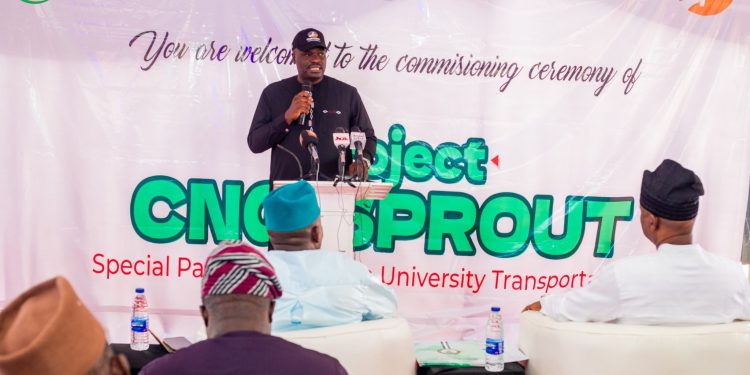The Federal Government has launched Project SPROUT; Special Palliative Relief of University Transportation, as part of its efforts to provide cleaner and more affordable transportation within Nigeria’s tertiary institutions. The initiative was unveiled on Thursday, May 29, 2025, in Abuja and is being spearheaded by the Presidential Compressed Natural Gas Initiative (PCNGI).
Project SPROUT involves the nationwide deployment of Compressed Natural Gas (CNG)-powered buses and tricycles across university campuses, targeting both students and staff. The project forms part of Nigeria’s broader strategy to transition to cleaner energy sources and curb rising transport costs in the wake of the 2023 fuel subsidy removal, which triggered sharp increases in commuting expenses.
In a statement shared on PCNGI’s official X account, the body described the project as more than a transport upgrade. It is a strategic push to modernize university mobility, empower youth, and foster technical innovation in the energy and transportation sectors. The introduction of CNG-powered vehicles is expected to ease intra-campus movement, lower daily commuting costs, and reduce carbon emissions across academic environments.
The Presidential CNG Initiative has already recorded significant milestones leading up to this launch. These include the conversion of 800 taxis to CNG at the Abuja Airport in October 2024 and the deployment of hybrid CNG-powered buses through partnerships with major transport unions in November 2024. Those efforts provided subsidized fares on popular urban routes and demonstrated early signs of Nigeria’s shift toward cleaner mobility.
Project SPROUT now places the spotlight on tertiary institutions, with selected universities to receive fleets of environmentally friendly buses and tricycles tailored to campus transport needs. The vehicles are designed not only for fuel efficiency but also to support the Federal Government’s climate goals and economic relief plans.
To encourage nationwide adoption, the government has established CNG conversion centers across various regions, with more in development. However, progress remains uneven. In Abuja, for instance, limited refueling infrastructure, the high cost of converting vehicles to CNG, and policy enforcement gaps continue to slow down the rollout. These challenges underscore the importance of sustained investment, improved infrastructure, and active collaboration with the private sector.
Since 2023, Nigeria has committed over \$450 million to building out its CNG value chain. Yet experts warn that achieving long-term success will depend heavily on expanding refueling stations, training a skilled workforce, and ensuring coherent implementation strategies.
Project SPROUT is now positioned as a critical step in aligning the nation’s education sector with a future of clean, affordable, and efficient transportation—while also serving as a model for low-carbon development in other public sectors.










